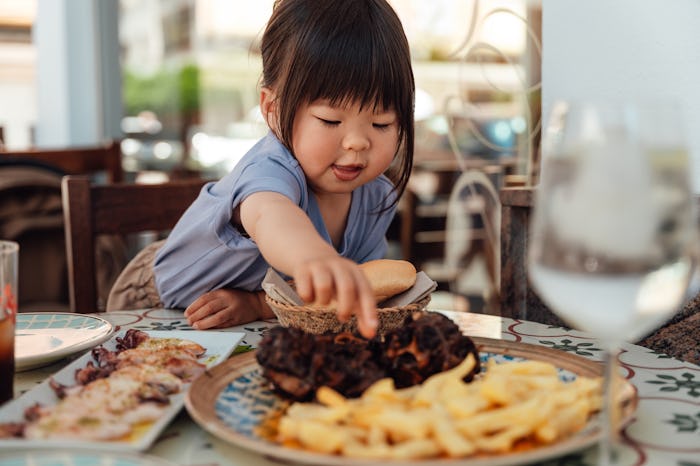No More Bites

Why Does My Toddler Think The Food On My Plate Is So Much More Delicious Than Her Own?
Yes, I’m glad she’s not picky, but why can’t she eat her own serving of curry?
Dinner starts at the same every night in our family. We don’t do separate meals or make chicken nuggets, even if we know it’s a meal our kids won’t necessarily want — everybody gets the same food on their plate. We do everything “right’ — that is, everything the experts suggest: Exposure to veggies and no screens and all around the table, eating together. This has mostly worked for us, until my 2-year-old decided to completely abandon her plate for mine.
I know I should be thrilled that my toddler likes spicy food and eats broccoli and says, “I try!” to every single item on my plate. But she only does this when it’s on my plate. She insists on eating my salad, even after I take a scoop and put it on her own plate so she can enjoy it for herself, And she loses her mind when I dare to suggest that she use her own spoon so I can actually enjoy the soup I’ve spent the last 45 minutes making,
Because toddlers gonna toddler. And truly, this is the only answer that keeps me from losing my mind when I try to understand most of the things my 2-year-old does. Amy Palanjian, author of the cookbook Dinnertime SOS and creator of the wildly popular Instagram account Yummy Toddler Food, tells me that even if my kid’s food looks exactly like mine, just on a different plate, it makes sense that she’d want to steal my eggs. Not only do kids love to model the behavior of people they love and trust, she says, but “they don’t understand boundaries.” Basically, while you might be annoyed, this is just one of those signs that your kids really love you.
There are, of course, some things you can try if you’re at your wit’s end. Palanjian suggests using the same plates for both kids and adults, so yours isn’t different and exciting — “salad plates are a great place to start” — and letting kids add their own food to their plates from the serving dishes so they can feel some agency and control over their meal. She also recommends giving them some kind of novelty item, like a tiny baby spoon they only use at the table or a big serving fork. “You don’t have to go buy anything, just find something unusual,” she says. “The other night, my son wasn’t into dinner, so I put a chopstick by his plate and he started to spear his food because it was fun, and eventually ate some.” Cocktail picks are another great option — they make fun novelty ones — if you think your kid can be trusted to use them safely.
But above all, do your best to react as little as possible. One of my least favorite things about myself as a parent is that I lose my cool when a child interrupts me when I’m trying to care for myself in a very simple way, like going to the bathroom or feeding myself a meal. In my toddler’s case, it’s not just that she disrupts a meal or barges into the bathroom; it’s that she wants to get the toilet paper for me, she wants to eat half of my sandwich. At dinnertime, when I’ve worked to keep it together all day and remain patient and calm and let her do all the boundary-pushing her little developing self requires, I find it particularly trying that she wants to touch every piece of pasta on my plate.
Palanjian suggests that maybe, if I’m feeling that bothered by our shared meals, we mayneed to take a break from family dinner for a little while. Palanjian points out that while it’s true that studies show that eating meals together has benefits for the whole family, they sometimes miss the larger context. “There is nothing inherently magical about dinner,” she says. “We can feed the kids and then eat more peacefully ourselves after bedtime and still meaningfully engage with them as they eat. We can eat breakfast or afternoon snack together if that works better for our schedule.” The important part of sitting down together as a family to share a meal, as she understands it, is the engaging-with-your-kid part, as well as modeling a range of foods and how to eat them. There are plenty of ways to do that.
You can try eating together just once a week for a stretch, and see if that makes things easier. “Sporadic or occasional meals together still can add up into a lot of benefit,” Palanjian says. “So ease off the pressure, especially if the logistics of cooking, feeding the kids, and feeding yourself all at the same time is stressing you out. It’s so much to manage, and the kids will also benefit from a parent who is not drowning under the weight of it all.”
We’re told over and over as parents to take care of ourselves, to model good habits, to make sure we fill our own cups once in a while. I don’t want a spa vacation or even a manicure appointment most days — I just want to eat my own oatmeal. And if that means eating once my kid’s done with her breakfast and distracted by Bluey, then I think I can be OK with that.
Besides, who knows how much more energy I’ll have to be patient if I actually get to finish my food?